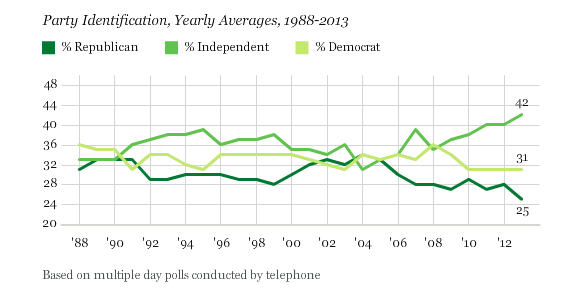Are Americans so increasingly tired of partisan politics that they’re eschewing labels and declaring themselves independents? Surely that seems to be the case. According to a new Gallup poll, 42 percent of Americans do not identify with either (major) political party:

As you can readily see, the Republican Party is somewhat struggling to retain their rolls. And what’s more, the percentage of Americans who self-identify as Republicans hasn’t been this low since 1983:
Americans' increasing shift to independent status has come more at the expense of the Republican Party than the Democratic Party. Republican identification peaked at 34% in 2004, the year George W. Bush won a second term in office. Since then, it has fallen nine percentage points, with most of that decline coming during Bush's troubled second term. When he left office, Republican identification was down to 28%. It has declined or stagnated since then, improving only slightly to 29% in 2010, the year Republicans "shellacked" Democrats in the midterm elections.
That’s right around the time “Bush fatigue” settled in -- that is, when the war in Iraq looked hopeless and the 2008 financial meltdown was right around the corner. But while Republican rolls are seemingly dwindling at alarming rates, Democrats aren’t faring much better. Since 2008, Democratic identification has fallen five percentage points in five years -- to 31 percent. No doubt this is partially attributed to the president’s waning popularity.
Recommended
Here's Gallup summarizing the results:
The rise in political independence is likely an outgrowth of Americans' record or near-record negative views of the two major U.S. parties, of Congress, and their low level of trust in government more generally.
Parting question: If more Americans than ever are checking the ‘no labels’ box, what kind of Republican candidates are expected to win national elections in the future? Rigid ideologues viewed as uncompromising, or centrist RINOS with more nuanced positions?

























Join the conversation as a VIP Member